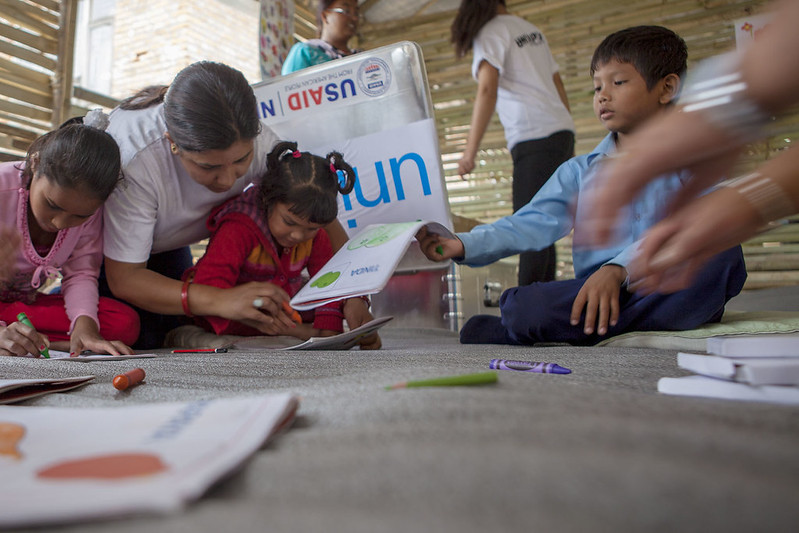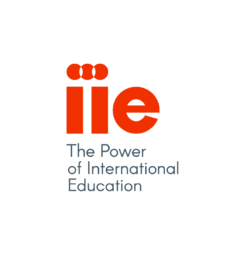RTAC Partners in Education Push for a Better Tomorrow
POSTED January 24, 2022
|Education

In recognition of International Day of Education on January 24, the Research Technical Assistance Center (RTAC) aims to highlight the professional expertise of ECD Measure and the Institute of International Education (IIE). These RTAC partners understand the importance of education and the challenges surrounding it. While their missions differ from one another, their focus for using education as a tool to better society unites them.
ECD Measure
The ECD Measure team are a group of researchers and policy experts who aim to improve early learning experiences for young children worldwide by supporting data-driven decision-making in early childhood systems.
ECD Measure founder and Associate Professor at the University of Nebraska Medical Center College of Public Health, Dr. Abbie Raikes and ECD Measure Chief Operation Officer, Rebecca Sayre believe that putting the right data in the hands of early childhood professionals and policymakers will help unleash greater potential for quality improvement in early childhood education. Based on child development research and implementation science, the ECD Measure model integrates scientific findings with research and insights on using data for improvement. “We support clients in the US, sub-Saharan Africa, Latin America, and Asia to use data to improve young children’s early learning environments to promote young children’s readiness for school. We enjoy working with diverse sets of stakeholders, from early childhood teachers to researchers to high-level policymakers, to improve children’s learning experiences,” explained Dr. Raikes.
To make impactful investments and ensure that early childhood education promotes equity for all children around the world, we need reliable data to document the quality of education and children’s outcomes.Dr. Abbie Raikes
When asked to reflect on what are the challenges facing early childhood education, Dr. Raikes and Ms. Sayre pointed to a lack of equitable access to quality early childhood education programs for all children.
“In recent years, there has been increased policy dialogue and investment in early childhood education. At the same time, there has been growing research on children’s early learning and classroom quality in low- and middle-income countries. Our team, who has extensive experience in both policy dialogue and research, observed that while more data were being collected globally, this was not necessarily translating into changes and improvements in early childhood systems,” stated Ms. Sayre.
In 2018, in partnership with USAID, ECD Measure launched a consortium to bring together researchers and decisionmakers to build capacity for data-driven decision-making in early childhood education. The Together for Early Childhood Evidence consortium builds capacity to generate and use early childhood education data in sub-Saharan Africa. ECD Measure has worked with country teams to identify their data and measurement priorities, facilitated cross-country learning to build on best practices from the continent, and supported local research initiatives in Ethiopia, Rwanda, South Africa, and Liberia to accelerate country-level action to improve young children’s early learning experiences.
 “To make impactful investments and ensure that early childhood education promotes equity for all children around the world, we need reliable data to document the quality of education and children’s outcomes. Data can help us routinely monitor the quality of services and provide feedback to parents, teachers, schools, and policymakers on how children are learning and how teachers are teaching. It can also help make decisions on where to invest scarce resources for the greatest impact on behalf of young children,” explained Dr. Raikes.
“To make impactful investments and ensure that early childhood education promotes equity for all children around the world, we need reliable data to document the quality of education and children’s outcomes. Data can help us routinely monitor the quality of services and provide feedback to parents, teachers, schools, and policymakers on how children are learning and how teachers are teaching. It can also help make decisions on where to invest scarce resources for the greatest impact on behalf of young children,” explained Dr. Raikes.
Institute of International Education (IIE)
 The Institute of International Education’s (IIE) USAID Programs Team works with partner organizations around the world to implement USAID programs focused on scholarship and fellowship management, workforce development, university partnerships and research, and local capacity development. Through its monitoring and evaluation methods, IIE utilizes continuous collaboration, learning, and adaptation to support sustainability beyond the lifecycle of a program.
The Institute of International Education’s (IIE) USAID Programs Team works with partner organizations around the world to implement USAID programs focused on scholarship and fellowship management, workforce development, university partnerships and research, and local capacity development. Through its monitoring and evaluation methods, IIE utilizes continuous collaboration, learning, and adaptation to support sustainability beyond the lifecycle of a program.
“What I enjoy most about international education is the emphasis on bringing people together to better understand each other, share and improve knowledge, and build long-lasting collaborative partnerships. It’s amazing to see the impact that cultural exchange and learning has on individuals and how people-to-people interactions can scale up to larger community-level changes,” explained Lindsay Hillenberg, Assistant Director of USAID Programs.
Currently, the largest challenge to international education is the COVID-19 pandemic. IIE works closely with partner organizations and higher education institutions, as well as program participants, to continually adapt programming and learning to virtual formats to ensure that the exchange of people and ideas can continue in these trying times.
What I enjoy most about international education is the emphasis on bringing people together to better understand each other, share and improve knowledge, and build long-lasting collaborative partnerships.Lindsay Hillenberg, Assistant Director of USAID Programs
IIE believes that when education transcends borders, it opens minds, enabling people to go beyond building connections to solving problems together. IIE’s vision is a peaceful, equitable world enriched by the international exchange of ideas and greater understanding between people and cultures.
“One example of this is the USAID JAdi Pengusaha MandiRI (Become an Independent Entrepreneur, or JAPRI) program, which equips poor and vulnerable individuals in Indonesia with basic entrepreneurship skills and access to business coaching and mentoring to improve work opportunities through self-employment. Since its launch in 2017, JAPRI has trained over 19,025 youth in social or leadership skills, while 4,289 women and 734 persons with disabilities have gained new or better employment,” noted Ms. Hillenberg.
IIE is an organization that prides itself on its commitment to promoting peace and development through education. Their USAID/Burma Lincoln Scholarship Program (LSP) began in August 2019 and by its completion in August 2026, it will have provided 135 future leaders from Myanmar with scholarships to study for Master’s degrees at U.S. universities. Concurrent with their U.S. graduate programs, Lincoln Scholars also undertake a two-year Conflict Analysis and Resolution course taught by George Mason University’s Jimmy and Rosalynn Carter School for Peace and Conflict Resolution. Despite the COVID-19 pandemic and February 2021 military coup in Myanmar, LSP has successfully recruited three cohorts of scholars, 48 of whom are currently studying for master’s degrees at universities throughout the U.S.
“IIE provides a high level of advising and mentoring to Lincoln Scholars to ensure they receive the support they need to excel in their academic programs while also focusing on their mental health and cultural adaptation. The success of LSP to operate and support scholars undergoing traumatic experiences under compounding challenges shows the importance of adaptive management, emergency preparedness, and close collaboration with local partners, USAID, and the US Embassy,” explained Ms. Hillenberg.
The RTAC network consists of more than 1,000 university-affiliated scholars and experts from around the world to offer timely research and actionable evidence to help make an impact in the field of international development. We are committed to the principles of education and believe in its transformative power that can help create a future to with better health outcomes, economic growth, a sustainable environment, and peaceful, democratic societies.
To read more about our other work in the education field, view our education resources.
